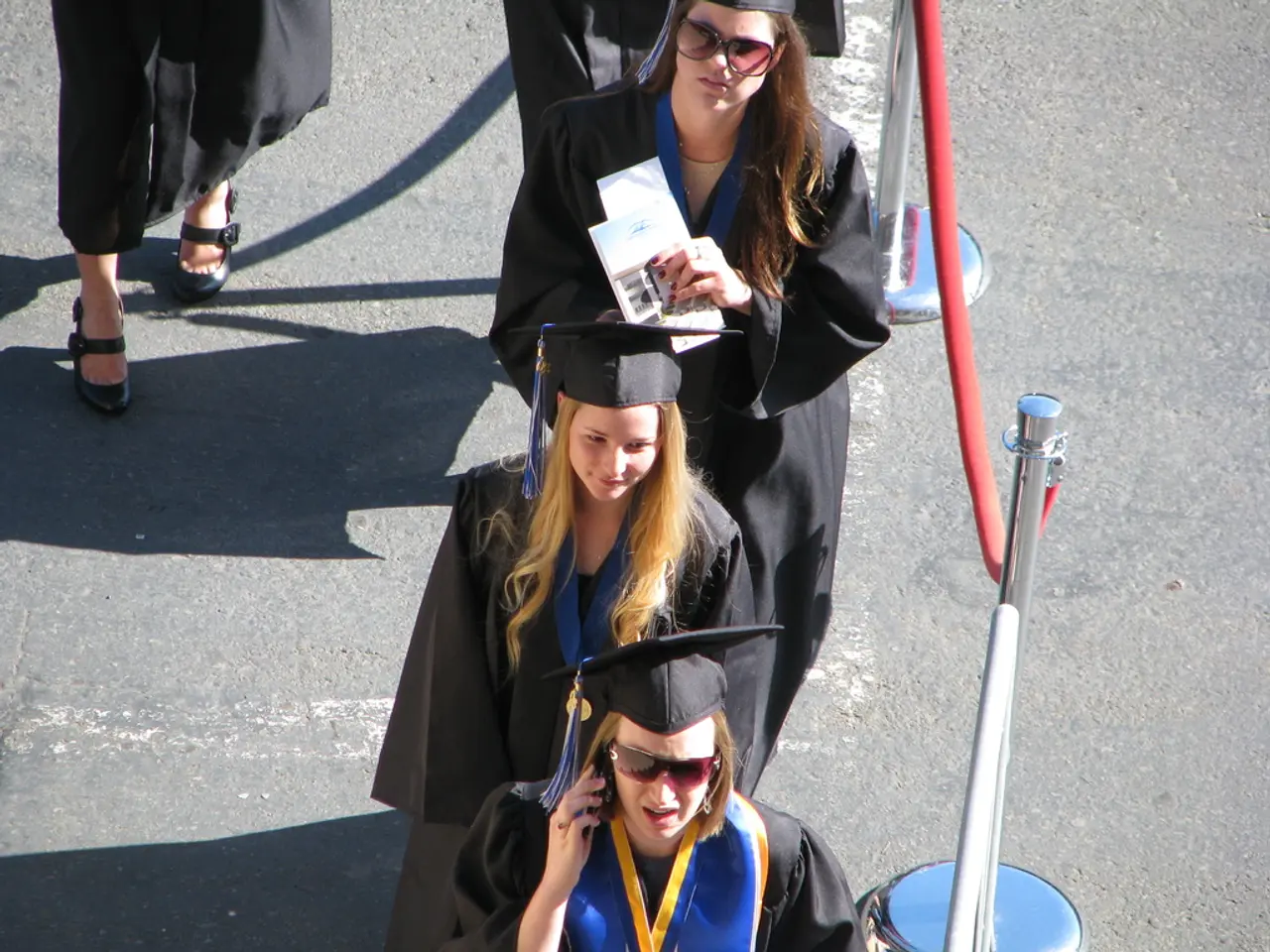International tightening of student visas under Trump administration prompts mutual benefit chances for other nations
The United Kingdom and Asia have seen a significant increase in international student applications, particularly for graduate programs and undergraduate studies, while the U.S. has experienced a decline in enrolment due to stricter visa policies under the Trump administration.
According to recent data, acceptances of international students for graduate programs in the U.K. grew an estimated 10% from last year, driven by demand for business and management courses in particular. This surge in interest has also been observed in Hong Kong, where the Hong Kong University of Science and Technology has seen a 40% surge in international undergraduate applications from last year.
In the U.S., applications from students, particularly from China, reached nearly 8,000 students - an increase of 10% compared with the previous year and a 20-year high. However, the U.S. visa policy changes under President Trump's administration led to a significant drop in international student enrolment, estimated at 30% to 40% for the fall 2025 term.
The U.S. government imposed stricter visa scrutiny and extended processing wait times, particularly in China, causing many prospective students to give up on applying or delay plans. The Trump administration enacted policies that revoked visas of some international students, including those with minor infractions, and paused visa interviews to implement new social media screening rules, creating uncertainty.
As a result, students and universities have looked towards alternate study destinations such as the UK, Germany, Ireland, and Australia. Specifically, UK undergraduate applications surged due to perceived greater visa flexibility and stability. In Hong Kong, universities began receiving inquiries from international students seeking to transfer from the U.S.
Moody’s analysts noted these policies posed financial risks for U.S. colleges by diminishing the U.S.'s reputation as a prime education destination and reducing international student revenue. Additionally, the U.S. Department of Homeland Security proposed new rules to impose fixed-term limits on student visas, which would require extension applications and could further impact enrolment.
This potential drop could deprive the U.S. economy of $7 billion in spending, according to the same analysis. As the second most popular destination for international students, Britain stands to gain from the U.S.'s perceived difficulties in admitting foreign students.
Opting for study in Asia has become a trend due to the easing of COVID-19 and exacerbated by the change of administration in the U.S. Demand from Chinese students has risen rapidly for universities places in Hong Kong, Singapore, and Malaysia. Dubai hosts dozens of international institutions' satellite campuses and saw international student numbers grow by a third in 2024-2025.
Meanwhile, some Asian families are no longer considering the U.S. as their first choice due to political turbulence and visa difficulties. Lisa Johnson, principal of Dubai's private American Academy for Girls, has noted an increasing trend of Emirati students looking away from the U.S. for college.
Daniel Palm, who has helped U.S. universities set up campuses abroad, notes that U.S. colleges are now asking about providing diversity and access due to students who want to come to the U.S. but cannot. Alisa, a Chinese college student studying data science, is considering alternative education options due to potential visa difficulties in the U.S.
In conclusion, the U.S.'s stricter visa policies have disrupted its traditional attractiveness as an international study destination, benefiting competitor countries and prompting many students to reconsider their options. The UK and Asia, particularly Hong Kong, have seen increased interest and applications from international students during this period.
- The United States government's stricter visa policies have led to a decrease in international student enrollment by an estimated 30% to 40%, according to recent data.
- As a result, many international students are now considering studying in the United Kingdom, especially in undergraduate programs, due to perceived greater visa flexibility and stability.
- In Hong Kong, universities have begun receiving inquiries from international students seeking to transfer from the U.S. due to the stricter visa policies.
- Meanwhile, some Asian families are no longer considering the U.S. as their first choice for higher education due to political turbulence and visa difficulties.
- opting for study in Asia has become a trend, with demand from Chinese students rising rapidly for universities in Hong Kong, Singapore, Malaysia, and Dubai.
- The U.S. Department of Homeland Security proposed new rules to impose fixed-term limits on student visas, which could further impact enrollment and potentially reduce the U.S. economy of $7 billion in spending from international students.




